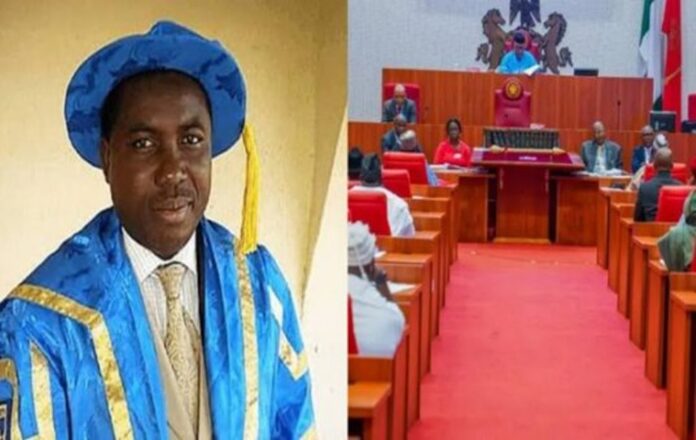The new chairman the Independent National Electoral Commission (INEC), Prof Joash Amupitan yesterday pledged to polls conducted during his tenure would be so transparent that every vote will count while losers will concede defeat and congratulate the winners.
Amupitan, whose appointment by President Bola Tinubu Tinubu was confirmed by the senate, also vowed to rebuild public trust and confidence in Nigeria’s electoral system and reduce voter apathy through transparency, civic education and technology-driven reforms.
“Our ultimate goal is to make elections so credible that even the loser will be able to congratulate the winner in good faith just as a judge delivers judgment and both sides accept it as fair and just.
“No voter will be disenfranchised. We will invest in logistics and technology. Where necessary, drones will be used to deliver materials to hard-to-reach areas. Every eligible Nigerian must be able to vote,” he declared on the floor of the senate.
Besides, he said one of his foremost priorities would be to restore confidence in the use of the biometric voter accreditation system (BVAS) and the INEC Result Viewing (IReV) portal.
He said he would conduct an audit of the INEC results viewing (IReV) portal to address glitches that undermined public confidence during the 2023, noting that the purpose of the BVAS and IreV are to ensure the integrity of elections, a goal shared by election technologies worldwide.
“I believe what happened in 2023 was subsumed as a glitch. Before the election, my understanding, based on a review of Supreme Court decisions, was that there was no clarity as to the purpose of IReV. There has been confusion over certain innovations introduced by INEC, such as the electronic collation system,” he said.
Amupitan further said the Supreme Court had later clarified that IReV is not an electronic collation system.
“The IReV was supposed to be a safeguard for comparison because the laws made by this senate did not do away with manual collation. However, IReV was supposed to provide some guarantee for checks and balances.
“On the issue of court decisions and technological systems, there has been confusion over certain innovations introduced by INEC, such as the electronic collation system.
“The Supreme Court has clarified some of these matters. When we assume office, we will assess the infrastructure on ground, review the technology, and adopt the best approach that enhances transparency and credibility in elections.
“I have to audit the system, if I’m given the opportunity, to see what is actually wrong and whether we have what it takes as it is now. Because it is not just the INEC responsibility, but also the other agencies like the Nigerian Communications Commission (NCC), Nigerian Identity Management Commission (NIMC) and the service providers that will have to work together to ensure that we give Nigerians the technology that everybody will be happy about.
“There will definitely be an audit of the system we are meeting and especially of the logistics of the election itself and ensure that the proper strategy is put in place. We all know the problem. So, we’ll find a proper strategy to be able to confront those problems headlong,” he added.
Answering questions on his alleged partisanship and defending Tinubu at the election petition tribunal, Amupitan said: “I did not lead the legal team of the president at the presidential election petition tribunal. I did not appear at the tribunal either at the Court of Appeal or at the Supreme Court. I was not a member of any team,” he said.
Besides, he denied that he served as part of the Peoples Democratic Party (PDP) or Labour Party (LP) legal teams.
On the conduct of the commission’s officers, the INEC helmsman said: The concern raised is indeed a major one and it reflects the worry of many Nigerians. One of the first things we must do at the commission is to establish a credible internal mechanism to monitor the conduct and behaviour of officials.”
Amupitan added that there is the need for an electoral offence commission that will be able to investigate perpetrators of electoral offences.
“I am taking this position on trust, and those who will work with me must also recognise that they are holding the trust of the Nigerian people. To maintain integrity, I intend to set up an ethics and compliance committee within INEC to audit reported cases of misconduct.
“There have been numerous reports of electoral malpractice in the past, some of which were never properly addressed. In some instances such as in Bayelsa and Adamawa states, a few offenders were prosecuted and even convicted. We intend to follow through on such cases to ensure accountability,” he said.
The INEC chief also promised to introduce a whistleblower policy within it to encourage people to report malpractices without fear of victimisation.
“We plan to develop a system that can detect, investigate, and prosecute misconduct, supported by forensic methods when necessary and strengthen INEC’s internal disciplinary process to ensure that all those involved in wrongdoing are brought to justice.”

























































